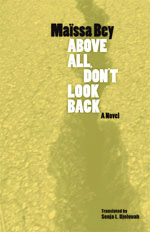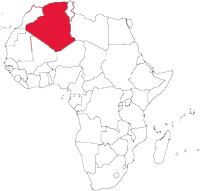

University of Virginia, paperback, 9780813928449
 In 2003 the north African country of Algeria was in a state of recovery after a decade-long civil war that claimed the
lives of over 160,000 Islamic fundamentalists, government troops and innocent civilians. On May 21 of that year a 6.8
magnitude earthquake struck just east of the capital of Algiers, and over 2,000 Algerians were killed in the initial
quake and the aftershocks that followed over the next several days. The government came under intense scrutiny and
criticism, as many recently constructed buildings collapsed due to shoddy building design and materials, and local
and national officials provided inadequate and untimely aid to the earthquake survivors. As a result, the already
fragile psyche of the Algerian people was damaged even further, as thousands of citizens faced displacement, fetid
and disease ridden tent cities, violence, and post-traumatic psychological trauma.
In 2003 the north African country of Algeria was in a state of recovery after a decade-long civil war that claimed the
lives of over 160,000 Islamic fundamentalists, government troops and innocent civilians. On May 21 of that year a 6.8
magnitude earthquake struck just east of the capital of Algiers, and over 2,000 Algerians were killed in the initial
quake and the aftershocks that followed over the next several days. The government came under intense scrutiny and
criticism, as many recently constructed buildings collapsed due to shoddy building design and materials, and local
and national officials provided inadequate and untimely aid to the earthquake survivors. As a result, the already
fragile psyche of the Algerian people was damaged even further, as thousands of citizens faced displacement, fetid
and disease ridden tent cities, violence, and post-traumatic psychological trauma.
Maïssa Bey, born near Algiers in 1950, originally taught literature until the 1990s, when she began to write in response to the effect of the war that plagued her country. She dedicated this novel to the memory of victims of natural disasters, including the 2003 earthquake and the 2004 Indian Ocean earthquake and tsunami.
The novel opens as the narrator Amina, a young woman from a respected family, walks through her village just after the initial earthquake has decimated her home and its surroundings. Unharmed but emotionally devastated by the damage and seeking to escape her upcoming arranged marriage, she decides to leave for Algiers. En route she is felled by the first major aftershock that strikes the region several days later. Unconscious and suffering from amnesia, she is brought to a refugee camp. Here she falls under the care of an older woman who names her Wahida and creates a makeshift family that includes Wahida and two other young refugees who have been separated from their families. Despite the difficult living conditions in the camp, 'Wahida' experiences freedom and the possibility of a brighter future, and the old woman provides her with the love and comfort that her mother rarely showed her.
The peace is soon disrupted by the entrance of a woman who claims that Amina is her lost daughter. Amina does not recognize the woman, and even though she is still plagued by amnesia, she initially rejects her. However, the woman's steadfast persistence together with a desire to learn about her true past cause Amina to leave the refugee camp and go the woman's house. Amina learns more about her supposed family's history and her place in it from the stories that her ‘mother' provides, but she cannot definitively link herself to the woman and her disturbing past. Amina and the reader are both left with numerous unanswered questions at the close of the novel.
Above All, Don't Look Back is a powerful novel about the traumas of war and natural disaster and their effect on
memory and the perception of reality in the lives of ordinary Algerians, and, in particular, in a troubled young woman.
The narrative has broader applicability to people who must rebuild shattered lives after natural and man-made disasters,
where answers and solutions are neither straightforward nor easily attainable.